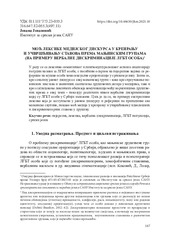Prikaz osnovnih podataka o dokumentu
Моћ лексике медијског дискурса у креирању и учвршћивању ставова према мањинским групама (на примеру вербалне дискриминације ЛГБТ особа)
The Power of the Vocabulary of Media Discourse in Creating and Strengthening Attitudes Towards Minority Groups (The Example of Verbal Discrimination of the LGBT Male Persons)
| dc.creator | Јовановић, Јована | |
| dc.date.accessioned | 2023-10-09T08:13:25Z | |
| dc.date.available | 2023-10-09T08:13:25Z | |
| dc.date.issued | 2023 | |
| dc.identifier.isbn | 978-86-7379-618-5 | |
| dc.identifier.uri | https://dais.sanu.ac.rs/123456789/15020 | |
| dc.description.abstract | У раду се са лексичко-семантичког и лингвокултуролошког аспекта анализирају погрдни називи за ЛГБТ особе, с посебним освртом на пејоративе којима се ре- ферише на мушке особе хомосексуалне оријентације у српском језику. Затим се, кроз анализу јавног дискурса о овој мањинској групи – како кроз проучавање но- винских текстова и званичних саопштења друштвених актера у медијима, тако и кроз сагледавање лексичких обележја комуникације међу корисницима друштве- них мрежа о овој теми – показују различити нивои вербалне дискриминације којој су ЛГБТ особе у Србији изложене. Циљ је да се, на примеру експресивне лексике која је заступљена у јавном дискурсу и реферише на припаднике ове мањинске скупине, покаже моћ медија у креирању и учвршћивању идеолошких и дискриминаторних ставова у друштву. | sr |
| dc.description.abstract | The paper analyzes derogatory names for LGBT persons from the lexical-semantic and linguacultural aspects, with a special focus on pejoratives referring to male persons of the homosexual orientation in the Serbian language. Then, through the analysis of the public discourse about this minority group – both through the study of newspaper texts and official announcements of social actors in the media, as well as by looking at the lexical features of communication among social network users on this topic – the different levels of verbal discrimination that the LGBT persons in Serbia are exposed to are shown. The goal is to demonstrate the power of the media in creating and strengthening ideological and discriminatory attitudes in society, using the example of the expressive lexicon that is represented in public discourse and refers to members of this minority group. | sr |
| dc.language.iso | sr | sr |
| dc.publisher | Niš : Filozofski fakultet | sr |
| dc.relation | info:eu-repo/grantAgreement/MESTD/inst-2020/200174/RS// | sr |
| dc.rights | openAccess | sr |
| dc.rights.uri | https://creativecommons.org/licenses/by-nc-nd/4.0/ | |
| dc.source | Jezik, književnost, moć | sr |
| dc.subject | пејоратив | sr |
| dc.subject | лексика | sr |
| dc.subject | вербална дискриминацијa | sr |
| dc.subject | ЛГБТ популација | sr |
| dc.subject | српски језик | sr |
| dc.subject | pejorative | sr |
| dc.subject | lexicon | sr |
| dc.subject | verbal discrimination | sr |
| dc.subject | LGBT persons | sr |
| dc.subject | Serbian language | sr |
| dc.title | Моћ лексике медијског дискурса у креирању и учвршћивању ставова према мањинским групама (на примеру вербалне дискриминације ЛГБТ особа) | sr |
| dc.title | The Power of the Vocabulary of Media Discourse in Creating and Strengthening Attitudes Towards Minority Groups (The Example of Verbal Discrimination of the LGBT Male Persons) | sr |
| dc.type | bookPart | sr |
| dc.rights.license | BY-NC-ND | sr |
| dc.citation.spage | 167 | |
| dc.citation.epage | 183 | |
| dc.identifier.doi | 10.46630/jkm.2023.10 | |
| dc.type.version | publishedVersion | sr |
| dc.identifier.fulltext | http://dais.sanu.ac.rs/bitstream/id/60211/bitstream_60211.pdf | |
| dc.identifier.rcub | https://hdl.handle.net/21.15107/rcub_dais_15020 |

